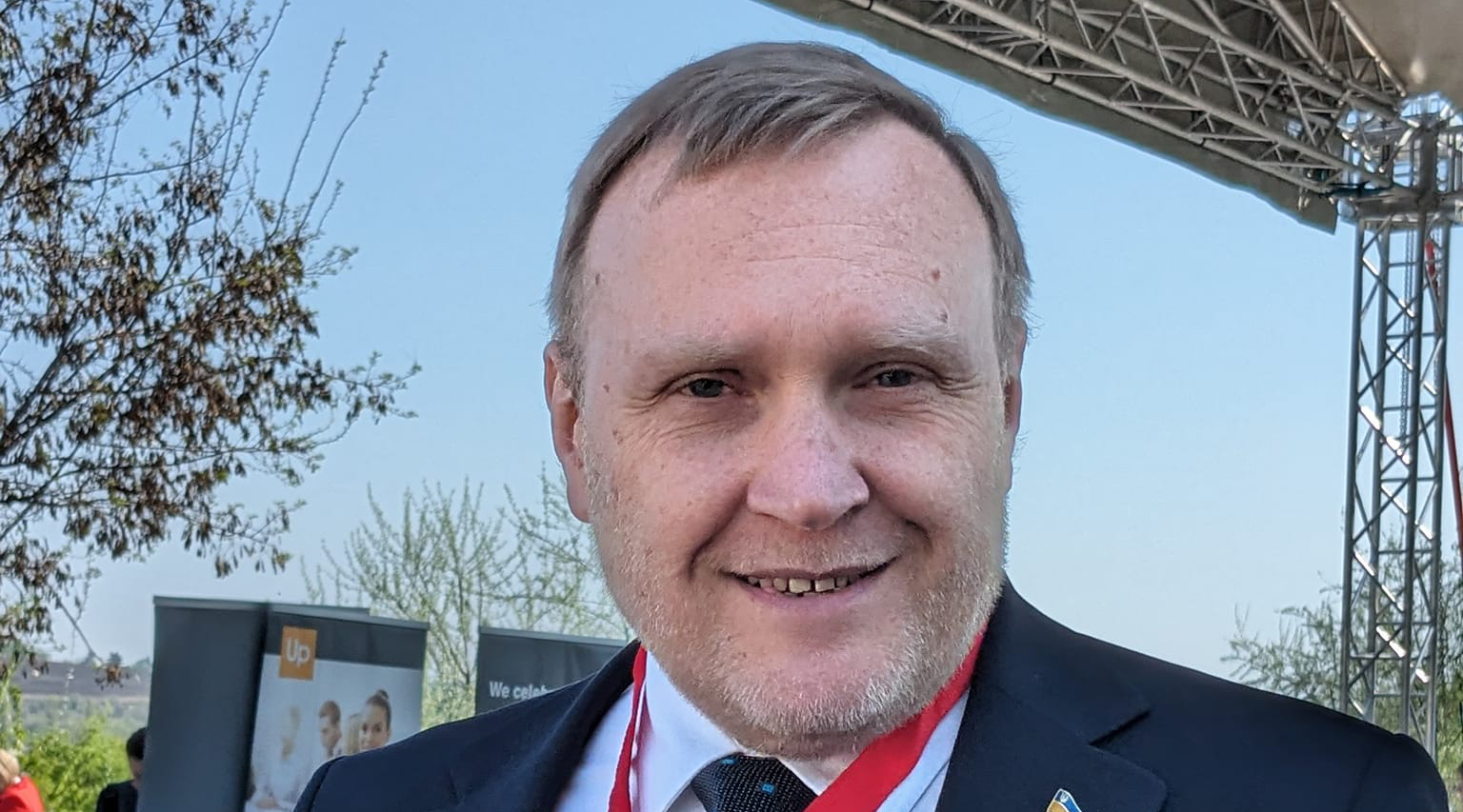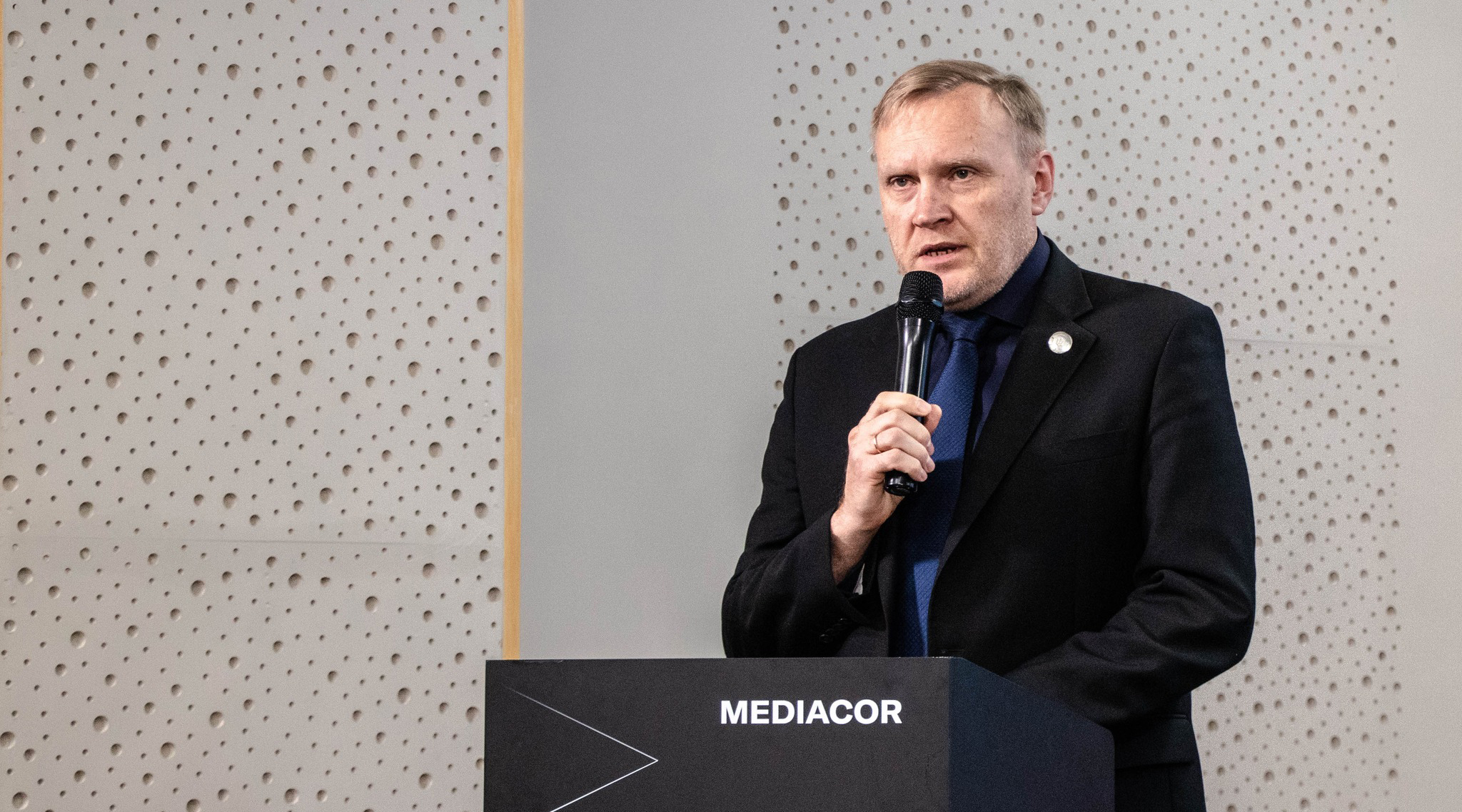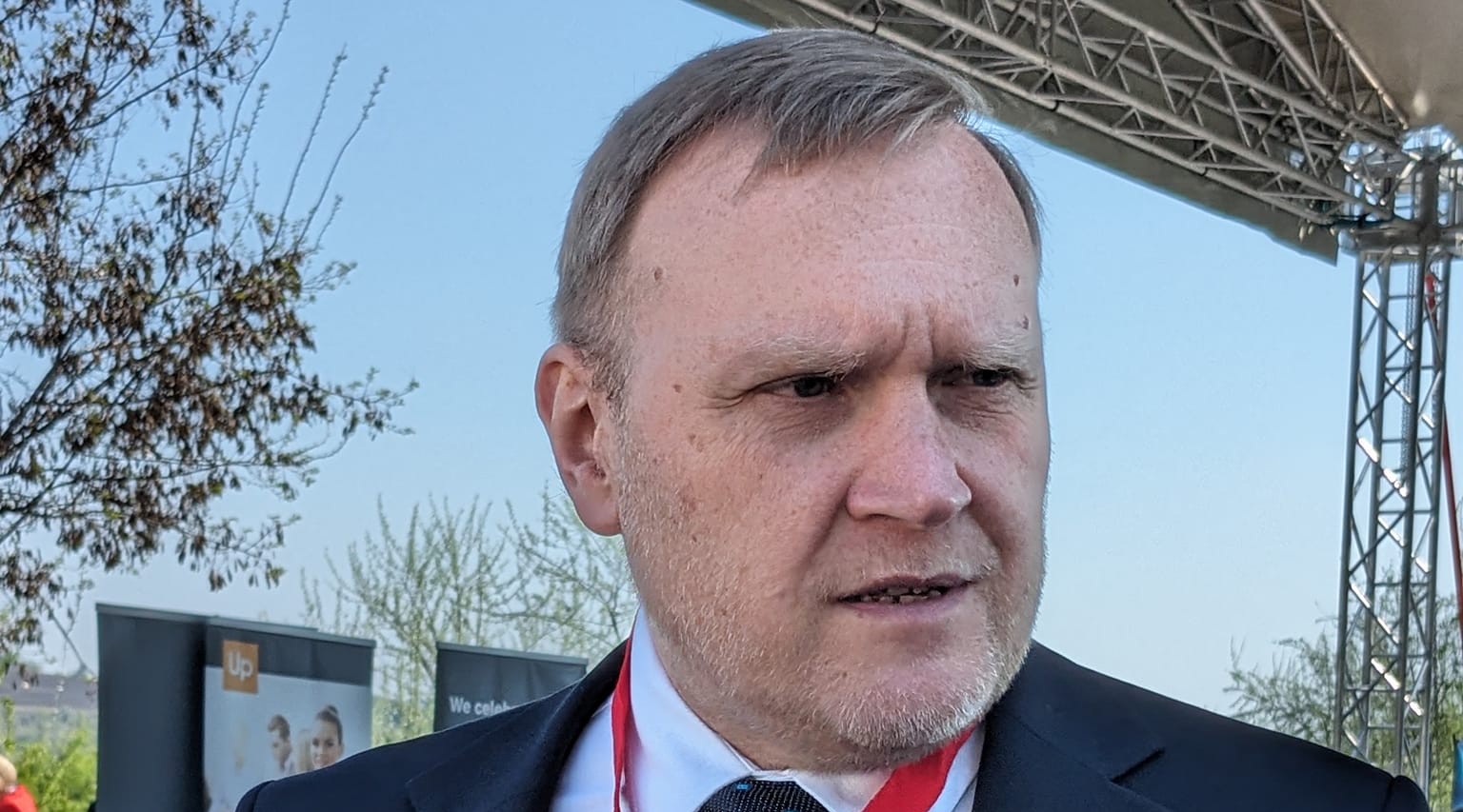The term in office of Ukraine’s Ambassador to the Republic of Moldova, Marko Shevchenko, is coming to an end as President Volodymyr Zelensky recently announced the diplomat would be replaced by former Secretary of the National Security and Defense Council, Oleksiy Danilov.
Ukrinform took the opportunity to speak with the head of the Embassy in Moldova during the International Mayors Summit in Chisinau on April 11. The Ambassador touched on the topics of the perception of Russia's war against Ukraine in Moldovan society, assistance to Ukrainian refugees, the Transnistrian settlement and consular services to Ukrainian citizens living in the Transnistrian region of Moldova, as well as European integration, bilateral infrastructure projects, and prospects for the development of European markets.
MOLDOVA HELPED DISPLACED UKRAINIANS
- Ambassador, how do Moldovans see Russia's war against Ukraine? Has their perception changed in the last two years? Do people feel an immediate military threat coming from Russia?
- If we are talking about the Moldovan society, they saw the beginning of the war as an emotional earthquake, the usual picture of the world that they had was disrupted. In practice, this manifested itself in extraordinary emotional empathy and willingness to help displaced Ukrainians. I know almost noone in Moldova whose home at the outset of the war didn’t become a shelter for Ukrainians fleeing the war. This also applies to Moldovan officials. In private conversations, many of them recall how they sheltered families from Mykolaiv, Odesa, Kherson, and other regions of Ukraine.
In fact, the society here was not ready for war in terms of economy, infrastructure, or readiness to accommodate a significant number of people at the same time, etc. But they managed to accept a huge wave of refugees, since Moldova is geographically very close to the southern and central regions of Ukraine. They were able to absorb this wave, while not having enough money or infrastructure – simply due to the empathy and emotional push of ordinary people who simply accepted Ukrainian refugees in their homes.
Of course, it was not about the best living conditions, but people shared what they had. It is important that they provided this assistance at the most difficult moment. Help that comes on time is much more valuable than that coming late.
Later, the international community got engaged, flows of humanitarian aid began – funds, food, medicines - but all came later.
Now, two years into the outset of full-scale aggression, some part of Moldovan society is weary of the topic of war and does not follow the developments on a daily basis. switched to their daily problems, eased up psychologically, realizing that Russian troops currently have no chance of invading Moldova, although it was previously assumed that they could. I remember frequent conversations with locals at the beginning of the war, when the most common question was "How is Mykolaiv doing?" What about Odesa?". They felt the breath of war very strongly at that time. But then they saw how the situation stabilized, learned about our counteroffensive, and now they perfectly understand that as long as Ukraine holds the front firmly, Russia cannot threaten them militarily.

MEDIATION BY RUSSIA UNACCEPTABLE IN TRANSNISTRIA SETTLEMENT
- Regarding the issue of Transnistria: our Foreign Ministry has clearly expressed the position that we consider the 5+2 settlement format, in which Russia serves as a mediator, to be ineffective, because it is an aggressor state. Does Moldova support this position?
- The Moldovan authorities agree that the 5+2 format is really dysfunctional. By launching a full-scale war against us, Russia compromised its status as a mediator and guarantor of a peaceful Transnistrian settlement. Ukraine cannot sit at the same table and cooperate, in particular on the Transnistrian issue, with those who are waging a war of aggression against us.
Therefore, the Moldovan authorities understand that under the current circumstances, this format of negotiations has no future. They are trying to develop a dialogue directly with Tiraspol on a number of issues of socio-economic interaction. Previously, before the war, Moscow would often repeat that Chisinau should "hear Tiraspol." And now, as Chisinau is developing these communications, but without the participation of Russia, the Kremlin isn’t too excited about it.
Moldova became an associate member of the European Union, the Moldovan (including Transnistrian) economy is now much more dependent on the European market than on the Russian one, many Transnistrian enterprises supply most of their products to European countries, not to Russia. And these are radical changes that have taken place in recent years in the matter of Transnistria's role and place within the Republic of Moldova.
Against this background, Moldova employs the tactics of small steps, trying to build an independent dialogue with Tiraspol. Early this year, Transnistrian enterprises de facto returned to the single customs space of Moldova. Until recently, Transnistrian entrepreneurs had certain preferential conditions regarding customs payments and fees to the budget of Moldova. But since January 2024, all enterprises, regardless of the residence – be it Chisinau or Tiraspol – operate under uniform customs conditions. No preferences. Of course, Transnistrian entrepreneurs don't like this too much, but this is about equal conditions and opportunities, as well as fair competition. It seems to me that this step will benefit Transnistrian entrepreneurs because they received an additional incentive to improve their performance in order to be able not only to maintain, but also to increase their presence on the markets of Moldova and Europe.

- The other day, the EU Ambassador to Moldova suggested that the country could theoretically gain EU membership even without Transnistria, although he admits that this would not be a preferable option for Brussels. What does Chisinau think of such prospects?
- Russia has long used the Transnistrian problem to stop or at least slow down Moldova’s movement toward the West. However, European integration is a priority for the Moldovan authorities and society as a whole. The current government of Moldova believes that the process of reintegration of the country can become an integral part of European integration. They believe that as the European market is opening, access to European funds will open, too, which will prepare the country to work in the conditions of the European market. The more opportunities appear in the candidate country, the more Transnistrian entrepreneurs, local authorities, and ordinary people will be interested in working under these conditions.
For example, more than 300,000 citizens of Moldova currently live in Transnistria. This happened because at some point holders of Moldovan passports became eligible to unhindered entry into EU countries and a number of other countries, so the Moldovan passport became attractive to the residents of Transnistria, who "voted" to get it. By the way, Russian officials like to claim that about 200,000 citizens of the Russian Federation live in the Transnistrian region and that they are not indifferent to their fate. But they don't add that more than 300,000 holders of Moldovan passports live in the same region – and very often these are the same people...
Therefore, I believe that the gradual entry of the Transnistrian region into the informational, economic, tax and all other spaces of Moldova as European integration deepens can be successful.
UKRAINIANS IN TRANSNISTRIA WILL NOT BE LEFT WITHOUT PROTECTION
- During his visit to Tiraspol at the end of February, the ambassador on special assignments, Paun Rohovei, informed the authorities of the Transnistrian region of Moldova of the readiness to consider the issue of resuming consular services to citizens on the condition that security guarantees are in place. Is the reaction of Tiraspol to this Ukrainian proposal already known?
- Actually, that statement was made after a meeting with the leadership of the Transnistrian region. We are really looking at that possibility, we are really thinking about our consuls resuming field consular service. We have set some conditions in this regard, and one of them lies on the surface, namely, we must be sure that our consuls are not in any danger during their stay in the territory not controlled by Chisinau. We need security guarantees for our staff. Regardless of whether they are holders of a diplomatic passport, or whether they are our employees from among the citizens of Moldova.
We are preparing to resume this process. Before the war, our consuls regularly came to the Transnistrian region, providing services to our citizens, of whom there are many. Now authorities in that region declared a heightened terrorism threat, accusations were made against Ukraine in this regard. But I hope that our consuls will still be able to resume field consular service. At the initial stage, we plan to focus on socially vulnerable categories of citizens – the elderly, the disabled, children, the sick, and others.

BILATERAL PROJECTS CONTINUE
- In June 2023, Ukraine and Moldova signed an agreement on the construction of a bridge across the Dniester near the settlements of Yampil and Koseut. At that time, it was reported that thanks to the project, Ukrainian exporters would get the shortest route from the center of Ukraine to the countries of Central and South-Eastern Europe. At what stage is this project now, given the situation around the blockade of the Polish border and new transport corridors becoming very relevant for Ukraine?
- Of course, the war confused our plans. Both Ukraine and Moldova were forced to repeatedly revise their budgets and funding priorities in favor of more urgent expenses. But despite this, the bridge construction project remains relevant for both countries. An intergovernmental agreement on the construction of this significant infrastructural project was signed and ratified, and a corresponding joint commission was created, which will directly settle the issues of this project. After all, in projects of this kind, there are always a huge number of technical issues that need to be dealt with.
- Ukraine currently faces various restrictions on its agricultural exports to EU countries. They are predicted to intensify during the accession negotiations. Does Moldova face similar restrictions? Are our countries competitors on the European market?
- Regarding specific restrictions for Moldovan products, no significant information has been received so far. And when it comes to potential competition, I usually say that the European market is too big for our enterprises to compete with Moldovan ones. I believe that there will be enough space for both countries. We can occupy different niches in this market, not be competitors, but provide mutual assistance, including having joint projects. We already have a successful partnership experience, particularly in the agricultural sector. For example, in 2022, when part of the regions of Ukraine – traditional suppliers of agricultural products – was temporarily occupied, the shortage of certain products was partially compensated by the efforts of Moldovan producers. I remember a report where visitors to a Chisinau street market complained that prices remain high even in fall, because, they say, part of the Moldovan harvest is sent to Ukraine. But on the other hand, I am sure that Moldovan producers were very pleased that there is such a large market that can absorb a significant part of their products.
Ievgen Matiushenko, Chisinau
Title photo: ava.md
